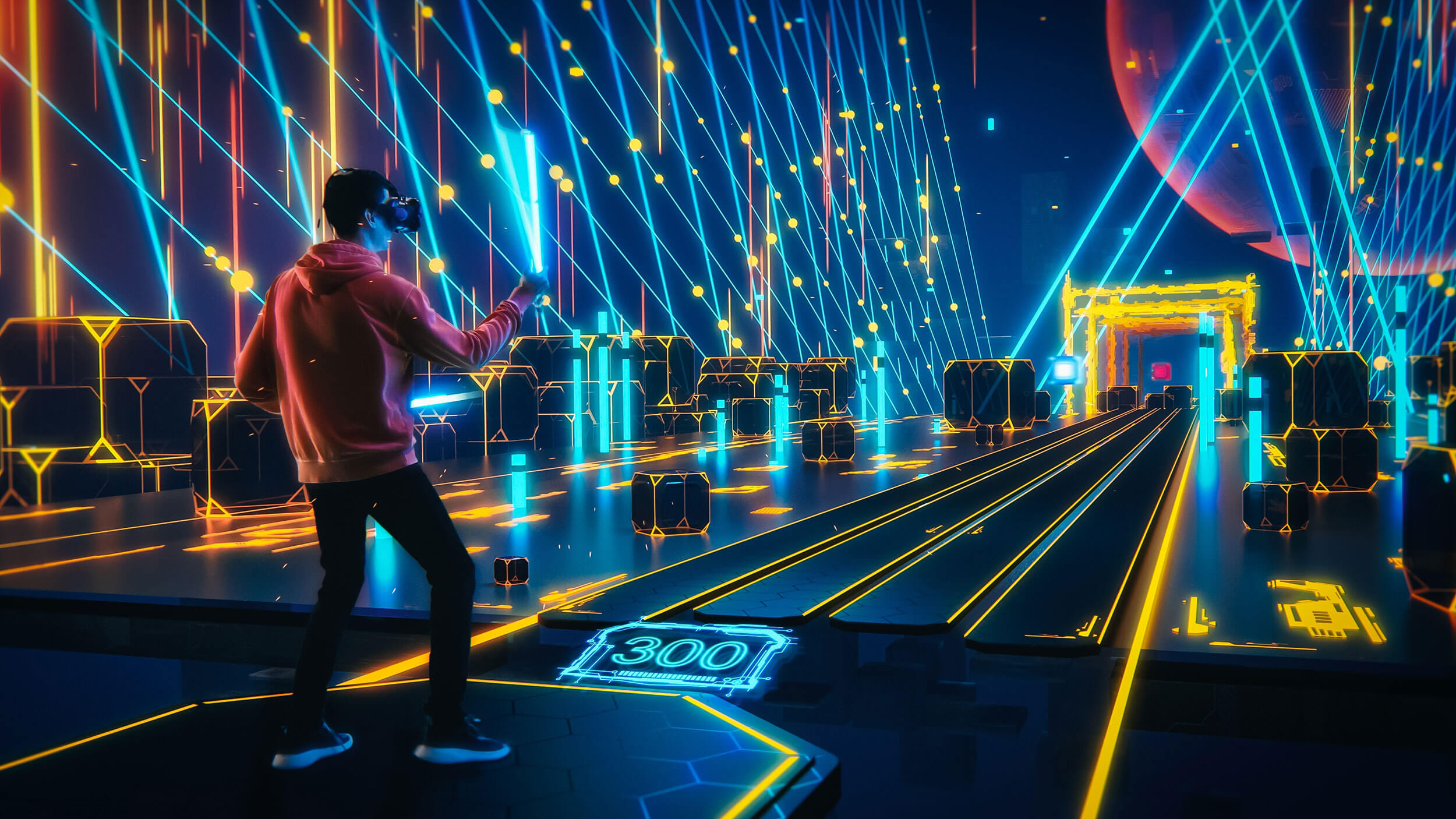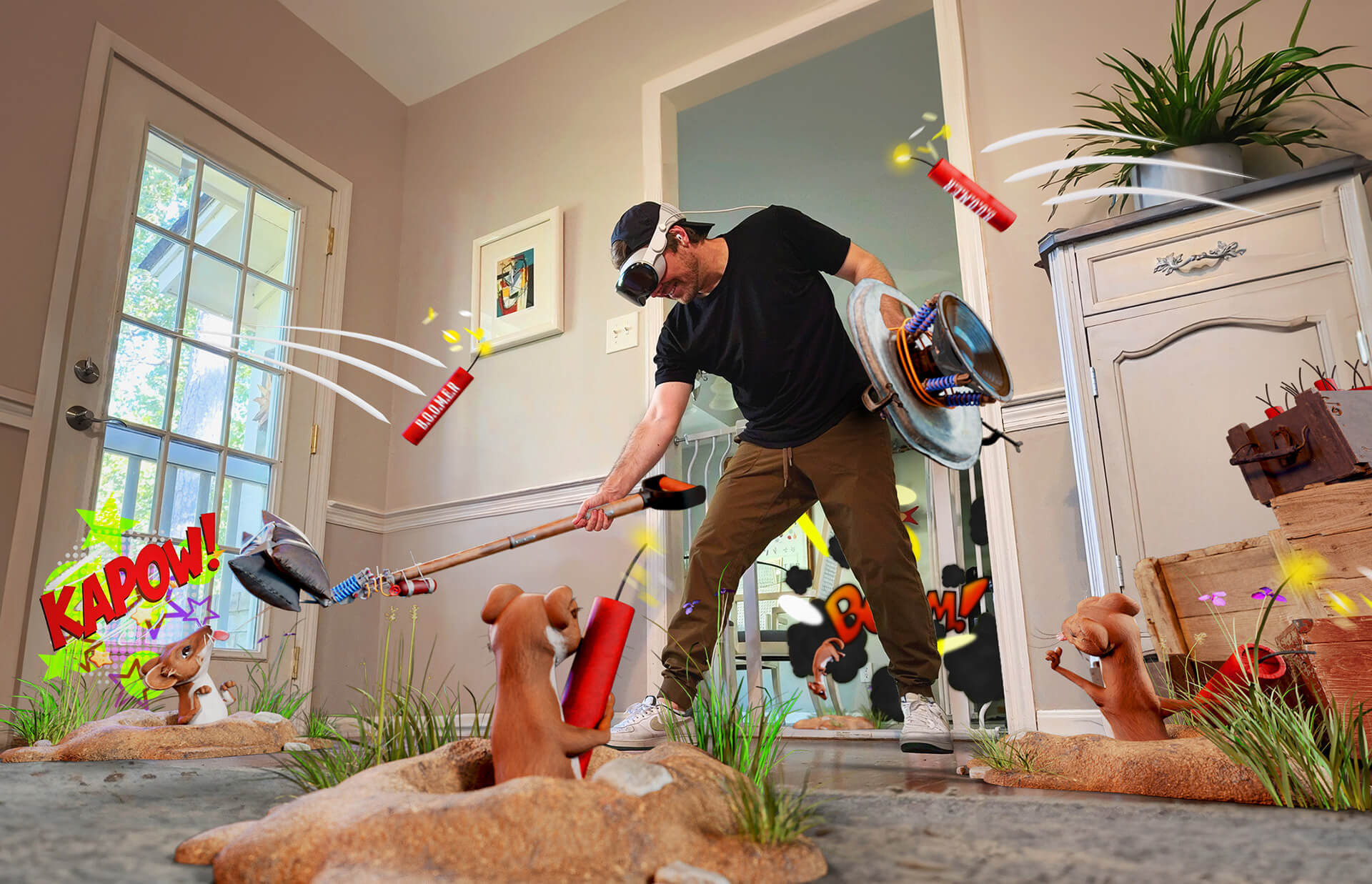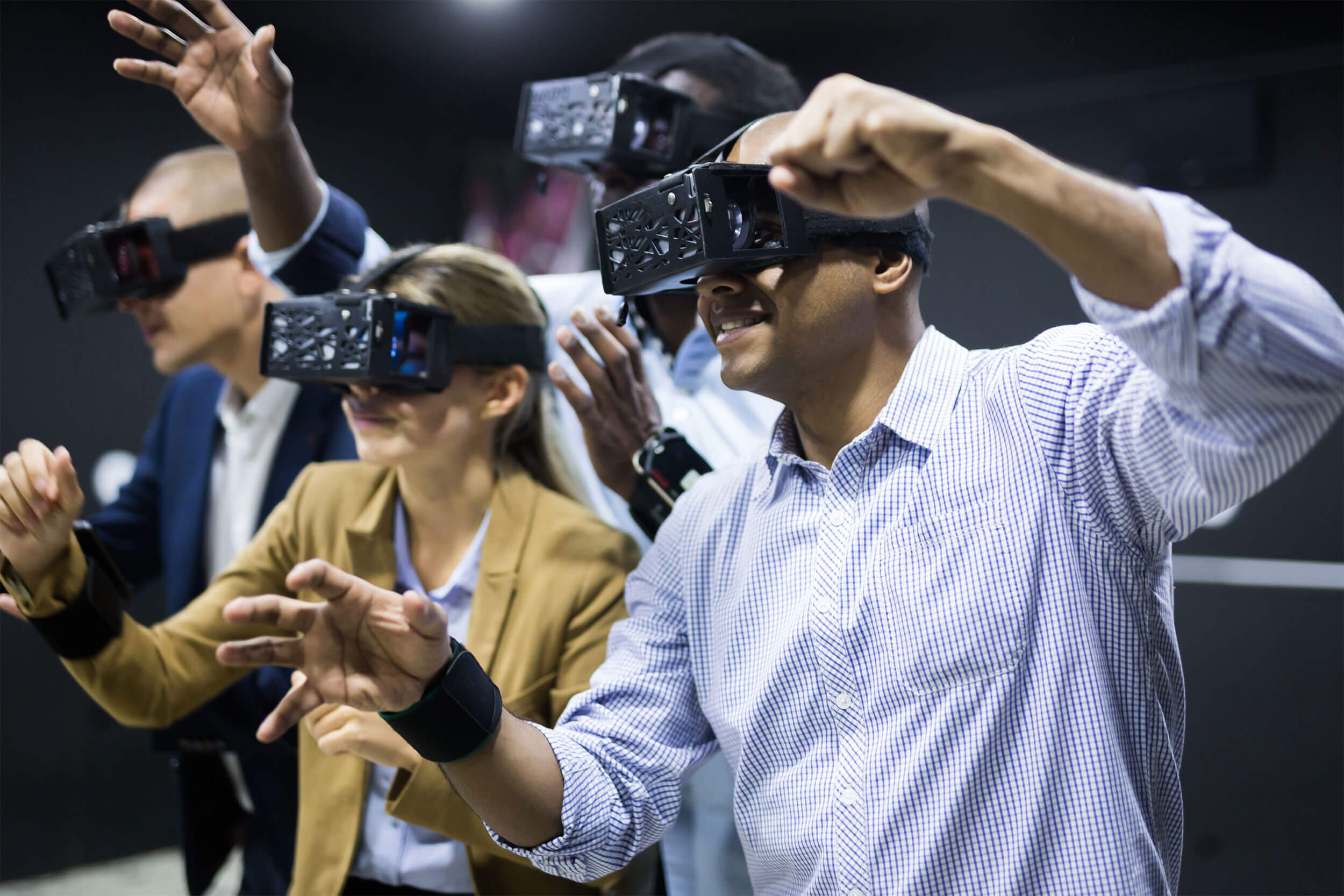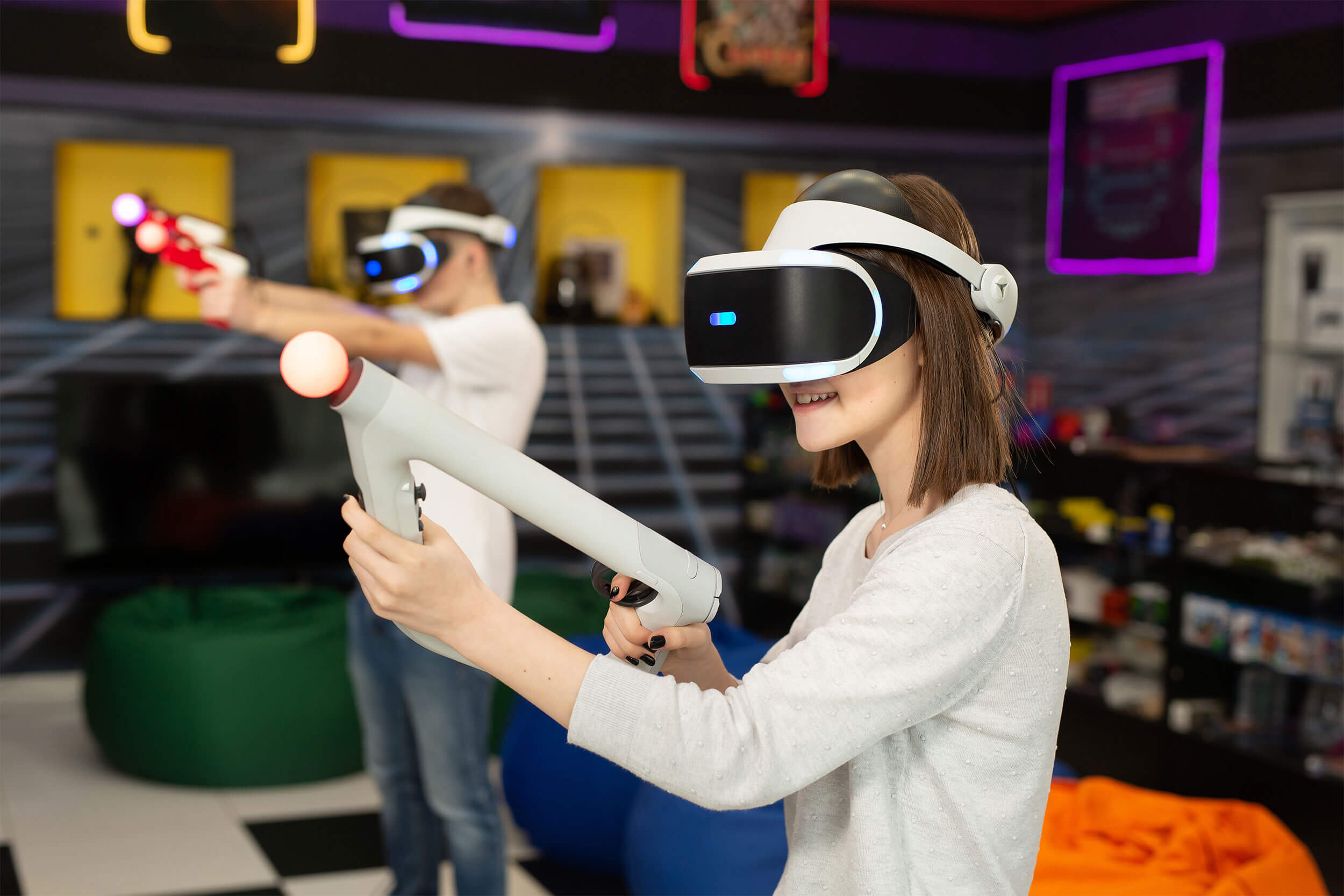There’s nothing quite like a bit of friendly competition to energize a corporate event or conference. Virtual Reality (VR) games are transforming events and experiential marketing experiences. By blending immersive storytelling with interactive gameplay, VR games create memorable moments that draw attendees in and keep them engaged. Whether it’s a trade show, conference, or product launch, using Virtual Reality for events offers a fun and impactful way to boost participation.
In this article, we’ll explore how VR games can elevate events, the industries that benefit most, key challenges to keep in mind, and examples for today’s and tomorrow’s event experiences.
Pop Goes the Weasel — a game we built for Apple Vision Pro and Meta Quest 3
Key Takeaways
- When are VR Games Worth It: VR games are ideal when your event’s goal is to create memorable, interactive experiences that engage attendees through immersive storytelling, hands-on interaction, or competitive gameplay.
- Future Trends in VR Games for Events: Advancements like hand tracking, gesture control, multiplayer integration, and AI-driven storytelling are shaping the future of VR gaming, making experiences more interactive and engaging.
- Key Considerations for VR Games at Events: Successful VR experiences require careful planning, including space management, hygiene protocols for devices, and designing short game loops to prevent long queues.
- VR Games as an Engagement Tool: VR games excel at drawing attention and driving booth traffic by creating exciting, memorable moments that encourage curiosity and participation.
- Alternative Solutions for Non-Headset-Based Experiences: For brands avoiding headsets, Augmented Reality based games offer an interactive alternative, allowing attendees to engage with content directly on their phones or tablets.

Do VR Games Actually Attract People to Booths?
VR games are powerful attention magnets. Like guerrilla marketing, they catch the eye with their visual appeal — people in headsets moving and interacting sparks curiosity from passersby. The key is to design VR games that align with your event’s goals and leave a lasting impression.
For example, RPR’s Apple Vision Pro: Warp Experience showcased Apple’s mixed reality technology with a game that immersed players in a spatial puzzle-solving challenge. Whether it’s a fast-paced competition that encourages high throughput or an interactive narrative that guides users through your product’s features, a well-crafted VR game makes attendees line up to try, eager to see what all the buzz is about.
Why Use VR Games for Events?
VR games create moments that attendees remember. For example, Lenovo’s F1 VR Racing Experience invited users to race in a thrilling VR simulation that mimicked real-world driving conditions, making it both fun and memorable.
By placing attendees inside a virtual environment where they can compete, interact, or solve challenges, VR games create stronger emotional connections. Benefits include:
- Drive Traffic to Booths: Interactive gameplay naturally attracts curious attendees.
- Increase Dwell Time: Attendees stay longer as they get invested in the experience.
- Boost Brand Awareness: Customized VR games can showcase products, tell a brand story, or highlight key features in an engaging way.
Let’s chat
Not sure where to start? Book a free strategy call with us to get started! No strings attached.

Industry Types That Can Use VR Games for Events
VR games are versatile and adaptable across industries. Here’s how different sectors can benefit from integrating VR gaming experiences into their events:

Networking & Corporate Events
VR games can break the ice at networking events, encouraging professionals to connect over shared experiences. Tech summits often feature collaborative VR puzzle-solving games or challenges that require teamwork and sparking conversations between participants. Sometimes during conferences, attendees can network and socialize while playing VR games in groups, helping to build new bonds.
Industrial & Technical Demonstrations
Complex machinery or large-scale processes can be visualized through interactive VR simulations, allowing participants to ‘build’ or manipulate objects virtually. A construction brand could showcase equipment through a VR game that lets users operate cranes or assemble structures safely. Some companies even offer “build you own” themed games with their products – similar to setting up your interiors and building your own home.
Sports & Stadium Experiences
VR games designed around sports-themed challenges can boost fan engagement. Imagine a VR penalty shootout game can put fans in the shoes of a professional footballer, or branded games like Beat Saber or TiltBrush at your booth to introduce attendees to experiential tech.
Technology
For brands in software, Web3, or AI, VR games can demonstrate abstract ideas through interactive simulations. Conferences in tech hubs like India have been known to invite companies like TechXR to bring in innovative VR games to their land. RPR has designed a Multi-level sales tool for Lenovo and their ThinkReality VRX headset, showcasing the capabilities of pre-release headset and data management in VR through interactive storytelling.
Consumer Brands
Pop-ups and retail events can leverage VR games for immersive product demonstrations. A beauty brand for example, can offer a VR makeover game where attendees experiment with different virtual styles before purchasing physical products. Also coming soon on Meta Quest is a VR sport experience by Ascis – called “DISCS”.
Automotive
Car brands can create VR driving simulations that immerse users in realistic road conditions. An auto manufacturer could design a VR racing game that highlights vehicle features like handling, acceleration, and design. Some booths, such as those seen in GDC 2024, even have car racing games on their booth as a fun addition.
Considerations and Challenges with VR Games in Events
While VR games are exciting, there are some key considerations to keep in mind:
- Space Requirements: Ensure your booth or event area has enough room for safe gameplay. Consider seating options for attendees with limited mobility.
- Queue Management: VR games can create long lines if gameplay takes too long. Consider designing shorter game loops or adding spectator screens so non-players stay engaged.
- Device Maintenance: Headsets should be cleaned frequently to maintain hygiene. Have extra units charged and ready to avoid interruptions.
- Game Design for All Ages: Events often attract diverse crowds. Designing games that are simple yet engaging ensures accessibility for all demographics.
- User Comfort: Avoid overly complex controls or physically intense gameplay to ensure users feel comfortable and safe.
Keep up to date
Sign up to our newsletter for exclusive updates and content, delivered directly to your inbox.
Are VR Games Worth It for Your Event?
VR games are highly effective when your event goals align with what guerilla marketing offers best — engagement, entertainment, and memorable experiences. RPR created a spatial puzzle-solving game that challenged users to manipulate their surroundings using the Apple Vision Pro, an interactive adventure or mini-quest as such fits perfectly in-between sessions, conferences and booth visits. If your audience thrives on immersive storytelling, hands-on interaction, or competition, VR gaming is a powerful tool.
However, for brands that prioritize fast-paced information delivery, simpler experiential marketing like AR may be more effective. Consider your audience, event space, and timeline before committing to a VR game experience.

The Future of VR Games in Events
As VR hardware advances, VR games are evolving with new capabilities like:
- Hand Tracking and Gesture Control: Removing the need for controllers, allowing users to interact directly with the virtual environment.
- Mixed Reality Integration: Combining VR with physical surroundings for even more immersive gameplay.
- Multiplayer VR Experiences: Enabling larger groups to compete or collaborate in real-time.
As these features become mainstream, VR games will continue to push creative boundaries. Using a combination of evolving capabilities can also support in bring people together even in the same room, reducing the isolation factors of VR. One such example would be RPR’s Defenderella – a virtual board game that uses Hand Gestures in Mixed Reality and allows Multiplayer engagement.
Alongside that, using AI in creation offers deep engagement and unique storytelling opportunities for rapid production. RPR specializes in designing custom VR games that align with your brand’s goals and timelines – as reflected in a recent webinar on building an XR game in just 1-week using AI. From concept to development and on-site setup, we create immersive VR experiences that leave a lasting impression. Whether you need a quick thoughtful production, fast-paced game for high-traffic events or a complex, interactive simulation for deeper storytelling, a strategic team ensures your VR activation is engaging and seamless.
FAQs on Using VR Games for Events
What VR games work best at events?
Fast-paced games, competitive challenges, or interactive puzzles that allow multiple players to stay engaged tend to work best.
How long should a VR game session last?
For high-traffic events, keep gameplay between less than 5 minutes end-to-end to maintain flow and minimize waiting times.
Do VR games require large spaces?
Not always. Seated VR experiences or games using hand tracking often require minimal space, making them ideal for smaller booths.
What’s the best headset for VR gaming at events?
Devices like the Meta Quest 3, Pico 4, and Apple Vision Pro offer wireless flexibility, easy setup, and strong performance for event activations.
What if we don’t want to use headsets for our events?
You may want to consider Augmented Reality games for events that users can play on their mobile phones or with a tablet.
References
- https://rockpaperreality.com/insights/virtual-reality/virtual-reality-for-events-how-to-stand-out-and-captivate-your-audience/
- https://rockpaperreality.com/our-work/pop-goes-the-weasel/
- https://rockpaperreality.com/insights/ar-use-cases/augmented-reality-for-events/
- https://rockpaperreality.com/our-work/lenovo-formula-1-vrx-experience/
- https://www.youtube.com/watch?v=1Tp6n3iDRP0&t=2s&ab_channel=RockPaperReality
- https://rockpaperreality.com/our-work/virtual-reality-proof-of-concept-for-lenovo-vrx/
